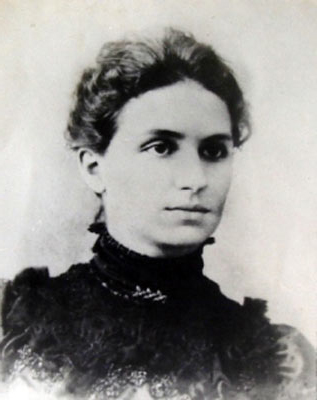
Maria Luisa Dolz (1854-1928): first reformist of women’s education and self-proclaimed feminist; a member of the pioneering women who attended the university.
Laura Martínez de Carvajal (1869-1941), pictured above: first Cuban female physician; fought against sexist prejudices which alleged a woman’s inability to absorb scientific knowledge, until then monopolized by male professionals.
Rosalia Herrera (1864-1948): exceptional soprano; first Cuban and first Hispanic woman worldwide to record her voice for the early record labels; although living abroad, she became a fierce advocate of a Cuban cultural patrimony and of the Island’s independence.
Carolina Poncet (1879-1969): first Cuban female anthropologist; outstanding researcher whose solid accomplishments proved the need for Cuban women to enjoy the right to play an active role in the international and national scientific communities.
Juana Borrero (1877-1896): one of the most outstanding Cuban poets and artists of the 19th century; her undervalued legacy is also symptomatic of an unjust and sexist historical bias.
The presentation will be held in Spanish.
BARUCH COLLEGE
25th Street, bet. Lexington and Third Aves., NYC
6th FLOOR: CONFERENCE ROOM 6-210
SPACE IS LIMITED
Free Admission
RSVP at: info@cubanculturalcenter.org
 Las cubanas en la posguerra; and Después de la guerra: ¿la paz? In 1983 she co-founded the Chair for Gender Studies at the University of Havana. Her all-encompassing doctoral thesis on the emergence and trajectory of the Cuban feminist movement in the 19th century remains unpublished, as well as four other books on key aspects of women’s role in Cuban society: Sociabilidad femenina cubana: asociacionismo y liderazgo en el siglo XIX; La mujer normada: redes de opresión y alternativas de resistencia; Presencia femenina en las publicaciones cubanas del siglo XIX; and Vida y acción de las cubanas durante la Reconcentración. During her tenure at the Instituto de Historia, and presently as an independent researcher, she has uncovered invaluable documentation that sheds new light on the social and political consciousness of women in 19th century Cuba. These not only include first-hand testimonials by white women, but also by slave and free black women. Prof. Vinat’s articles on related topics, including dance and gender, the female musical discourse, religion, woman and the family, cultural identity, and racism have appeared in scholarly journals in Cuba, Mexico, Venezuela, the Dominican Republic, and Spain.
Las cubanas en la posguerra; and Después de la guerra: ¿la paz? In 1983 she co-founded the Chair for Gender Studies at the University of Havana. Her all-encompassing doctoral thesis on the emergence and trajectory of the Cuban feminist movement in the 19th century remains unpublished, as well as four other books on key aspects of women’s role in Cuban society: Sociabilidad femenina cubana: asociacionismo y liderazgo en el siglo XIX; La mujer normada: redes de opresión y alternativas de resistencia; Presencia femenina en las publicaciones cubanas del siglo XIX; and Vida y acción de las cubanas durante la Reconcentración. During her tenure at the Instituto de Historia, and presently as an independent researcher, she has uncovered invaluable documentation that sheds new light on the social and political consciousness of women in 19th century Cuba. These not only include first-hand testimonials by white women, but also by slave and free black women. Prof. Vinat’s articles on related topics, including dance and gender, the female musical discourse, religion, woman and the family, cultural identity, and racism have appeared in scholarly journals in Cuba, Mexico, Venezuela, the Dominican Republic, and Spain.Presented as part of our year-long celebration of the 500th anniversary of the City of Havana, culminating in our 18th annual flagship conference, Oda a La Habana: The first 500 years,
to be held at Barnard College on Sunday, November 17th, 2019.
